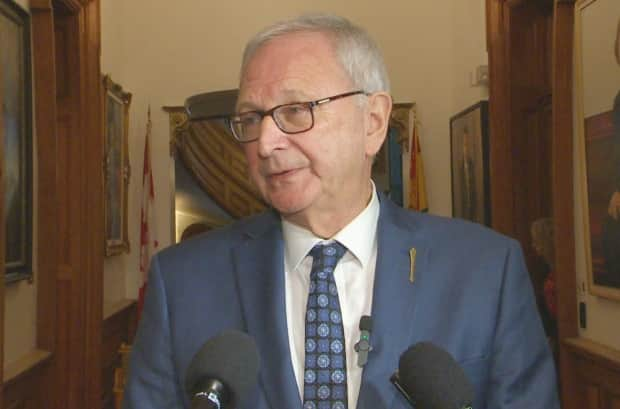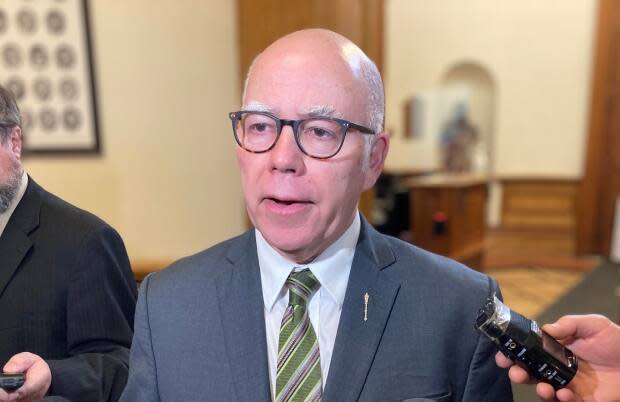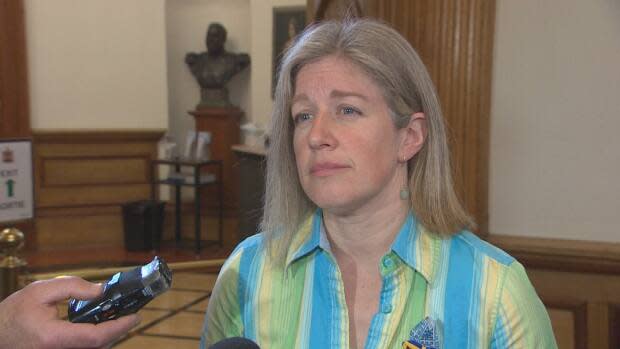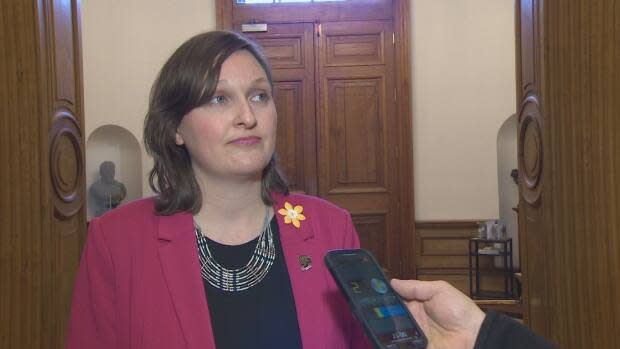MLAs giving themselves big pay raises — but only if they're re-elected

Members of the New Brunswick legislature return to the chamber this week for a final two weeks of pre-summer business that will include a vote on raising their own salaries.
A bill before the legislature increases pay levels for the premier, ministers, party leaders and all MLAs.
But there's a big caveat: they'll need to win new mandates from voters first.
The legislation says the increases take effect Nov. 1, 2024, 11 days after the scheduled date of the next provincial election.
"We're not voting this for ourselves, unless we're re-elected," Green MLA Megan Mitton said during a recent committee discussion of the bill.

Combined with legislation last year that unfroze cabinet-level salaries for the first time since 2015, Premier Blaine Higgs would see his total income jump from $152,150 in 2021 to $186,252, if he's still in the job then.
The committee of MLAs that studies legislation approved the bill, without objections, in just 14 minutes last month.
There was no exploration of the details of the salary formulas or how they'll translate into dollars.
"I guess when we're talking MLA compensation, perhaps that old adage 'sometimes less is more' — maybe that's the approach for the day," government House leader Glen Savoie said during the May 24 meeting.
The legislation follows the recommendations of a November 2022 report by an independent commission appointed to examine the issue.
"This is a very sensitive topic. We know how folks feel about it. But it really was something that the commissioners wanted to make sure that they got right," Savoie said during the brief committee discussion of the bill.
"They were exhaustive in their efforts to arrive at what they felt was the right number."

The bill increases the base pay for all MLAs to $93,126. The premier's minister salary will be the same amount for a total of $186,252.
The premier's pay is then the starting point for a formula that sets the top-ups for other officeholders, including party leaders, house leaders, caucus chairs, whips, the speaker and deputy speakers.
The bill deviates from the commission's recommendations in two ways approved by the legislative administration committee, an all-party group of MLAs that meets in secret to oversee the legislature's operations.
Pay raise higher than recommended
The legislative committee awarded a higher pay increase to leaders of parties in the house other than the government or the official opposition, such as Green Party leader David Coon.
The independent commission recommended the top-up be 25 per cent of the premier's cabinet salary, but the committee made it 50 per cent — a change worth an additional $23,281 for Coon, assuming he is still an elected party leader in November 2024.
The committee also boosted the formula for the government caucus chair, the official opposition caucus chair and the house leader of any third parties, ensuring they'll get more money too.
It also made the decision to have the bill take effect in November 2024, overruling a recommendation by the commission that the pay raises take effect this spring.
The commission said in its report that waiting until after the next election created a risk that salaries "will become a political issue on the campaign trail, with all parties promising to roll back these recommendations and maintain the status quo, if elected."
But Savoie and others said setting the date after the election avoids "that perception that MLAs are voting on their own salaries."
The legislation will tie future increases to what's known as part one of the civil service — employees of government departments. The existing law links the base salary to growth in the gross domestic product.

That change put an end to a series of salary gimmicks and reversals dating back more than a decade and a half.
All MLAs earn base salaries, and those that hold cabinet posts or other positions get additional money on top of that.
In 2008, the legislature froze base MLA salaries at $85,000 per year, a freeze that remained in place until last year.
Then, in 2017, the Gallant Liberal government cut back cabinet salaries with a legislative amendment that said they would return to normal levels only when the budget was balanced.
But the Liberals also forgot to pass legislation to override automatic MLA raises and keep those salaries frozen. So it retroactively refroze them and extended the reduced ministerial salaries to March 2021.
Higgs extended that reduction to March 2022.
When it expired last spring, ministerial salaries jumped from $47,353 back to $52,614 for a total of $137,614 when the MLA base salary was added.
The premier's, at $67,150, returned to $79,000 for a total of $164,000.
The new bill raises them further thanks to the hike to the base MLA pay to $93,126.

That base pay figure is based on what the salary would have been last year based on GDP growth, had the freeze not been in effect.
Official Opposition leader Susan Holt will earn $158,314 — the newly increased base salary for MLAs, plus 70 per cent of the premier's top-up, if she is still in that position in November 2024.
Green Leader David Coon would earn $139,689, the total of his increased MLA salary, plus 50 percent of premier's ministerial salary.
Savoie is both a cabinet minister and government house leader, but a spokesperson said he would not collect the two top-ups, only the one for his ministerial position.
MLAs who attend committee sessions will also earn an extra $125 per day on top of their travel per diems as a result of the changes. Committee chairs will get $200 per day.
The legislature begins sitting again on Tuesday.


